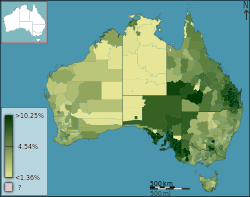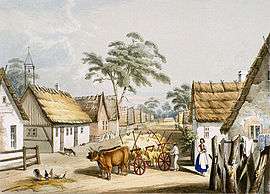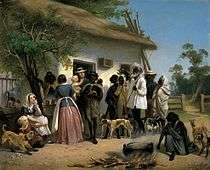German Australians
| Total population | |
|---|---|
|
(German 898,674 (by ancestry, 2011) 108,003 (by birth, 2011) 4.5% of total Australian population.[1]) | |
| Regions with significant populations | |
| South Australia, New South Wales, Victoria, Queensland | |
| Languages | |
| Australian English, German, Barossa German | |
| Religion | |
| Predominantly Lutheranism and Roman Catholicism.[2] |
German Australians (German: Deutsch-Australier) are Australian citizens of ethnic German ancestry. The German community constitute one of the largest ethnic groups in Australia, numbering 898,700 or 4.5 percent of respondents in the 2011 Census. It is the sixth most identified ancestry in Australia behind 'Australian', 'English, 'Irish, 'Scottish' and 'Italian'.
Demography

The 2011 Census counted 108,000 Australian residents who were born in Germany.[1] However, 898,700 persons identified themselves as having German ancestry, either alone or in combination with another ancestry.[1] This number does not include people of German ancestry who selected their ancestry as simply "Australian". The 2001 census recorded 103,010 German-born in Australia, although this excludes persons of German ethnicity and culture born elsewhere, such as the Netherlands (1,030), Hungary (660) and Romania (440).
In December 2001, the Australian Department of Foreign Affairs estimated that there were 15,000 Australian citizens resident in Germany.[3]
According to the 2001 Census, the Germany-born are more likely than Australians as a whole to live in South Australia (11.9 per cent to 7.6 per cent) and Victoria (27.0 per cent to 24.7 per cent). They are also more likely to live in rural and regional areas. It is probable their German Australian children share this settlement pattern.
According to census data released by the Australian Bureau of Statistics in 2004, German Australians are, by religion, 21.7 per cent Catholic, 16.5 per cent Anglican, 32.8 per cent Other Christian, 4.2 Other Religions and 24.8 No Religion.
In 2001, the German language was spoken at home by 76,400 persons in Australia. German is the eighth most widely spoken language in the country after English, Chinese, Italian, Greek, Arabic, Vietnamese, Spanish, and Tagalog.
Immigration history
| No. of arrivals July 1949 – June 2000[4] | July 1949 – June 1959 | [lower-alpha 1]July 1959 – June 1970[lower-alpha 2] | |
|---|---|---|---|
| Germany | 255,930 | 162,756 | 50,452 |
| Total settler arrivals | 5,640,638 | 1,253,083 | 1,445,356 |
| Percentage of settlers from Germany | 4.5% | 13.0% | 3.5% |
Germans have been in Australia since the commencement of European settlement in 1788. At least seventy-three Germans arrived in Australia as convicts.[5]
1800s


Germans formed the largest non-English-speaking group up to the 20th century.[6]
Forty-Eighters
Forty-Eighters is a term for those who participated in or supported the European Revolutions of 1848. Many emigrated as a result of those revolutions. In particular, following the ultimate failure of the "March Revolution" in Germany, a substantial number of Germans emigrated to Australia. See Forty-Eighters in Australia.
Fleeing militarism
Many Germans had emigrated to Australia to flee the rise of militarism and martial chauvinism in the land of their birth. Indeed, "After the Unification of Germany under Prussia in 1870/1871, when Universal Conscription was brought in across all the States of Deutschland, the pattern of emigration from Germany to Australia changed. Instead of the earlier pattern of the majority of settlers arriving in families, young single men started to arrive, young men who were at odds with the increasing militarisation of their Fatherland, and also often at odds with the Rampant Chauvinisation of German Social Life."[7]
1900s
By 1900, Germans were the fourth-largest European ethnic group on the continent, behind the English, Irish and Scots.[8]
By 1914, the number of German-Australians (including the descendants of German-born migrants of the second and third generation who had become Australians by birth) was estimated at approximately 100,000.[9]
During both World Wars Germans were considered an "enemy within" and a number were interned or deported – or both. The persecution of German Australians also included the closure of German schools, the banning of the German language in government schools, and the renaming of many German place names. To avoid persecution and/or to demonstrate that they commit themselves to their new home, many German Australians changed their names into Anglicised or Francophone variants.
After the Second World War, Australia received a large influx of ethnic German displaced persons who were a significant proportion of Australia's post war immigrants. In the 1950s and 1960s, German immigration continued under assisted migration programs promoted by the Australian Government. Between June 1949 and July 2000, Germany was the fifth most common birthplace for settler arrivals in Australia after United Kingdom and Ireland, Italy and New Zealand.[4] By 1991, there were 112,000 German-born persons in Australia.
Tourism
Australia has long been a popular destination for German backpacker tourists and students.[10]
Education
There are the following German international schools in Australia:
German Australian culture
The Australian wine industry was the creation of German settlers in the nineteenth century.[11]
The Goethe-Institut is active in Australia, there are branches in Melbourne and Sydney.[12]
Notable Australians of German ancestry
| Name | Born | Description | Connection to Australia | Connection to Germany |
|---|---|---|---|---|
| Eric Abetz | 1958 | Australian Senator | Emigrated to Australia from Germany in 1961 | Born in Germany |
| Eric Bana | 1968 | Australian Actor | Born in Australia | German mother |
| Bettina Arndt | 1949 | Sexologist and critic of feminism | Born in the United Kingdom | German father |
| Heinz Arndt | 1915 | Economist | Emigrated to Australia | Born in Germany |
| Shaun Berrigan | 1978 | Rugby League player | Born in Australia | German ancestry |
| Henry Bolte | 1908 | Politician (Premier of Victoria) | Born in Australia | German ancestry |
| Dieter Brummer | 1976 | Soap opera actor | Born in Australia | German ancestry |
| Ernest Burgmann | 1885 | Anglican bishop and social justice activist | Born in Australia | German ancestry |
| Meredith Burgmann | 1947 | Politician (Australian Labor Party) | Born in Australia | German ancestry |
| Wolfgang Degenhardt | 1924 | Artist | Emigrated to Australia | Born in Germany |
| Carl Ditterich | 1945 | Australian rules footballer | Born in Australia | German ancestry |
| Andrew Ettingshausen | 1965 | Rugby League player | Born in Australia | German ancestry |
| Brad Fittler | 1972 | Rugby League player | Born in Australia | German ancestry |
| Harry Frei | 1951 | Cricketer | Emigrated to Australia | Born in Germany |
| Gotthard Fritzsche | 1797 | Lutheran pastor | Emigrated to Australia | Born in Germany |
| Ken Grenda | Businessman and philanthropist | Born in Australia | German ancestry | |
| Michael Grenda | 1964 | Olympic cyclist | Born in Australia | German ancestry |
| Andre Haermeyer | 1956 | Politician (Australian Labor Party) | Emigrated to Australia | Born in Germany |
| Heinrich Haussler | 1984 | Cyclist | Born in Australia | German ancestry |
| George Heinz | 1891 | Australian rules footballer | Born in Australia | German ancestry |
| Hans Heysen | 1877 | Landscape artist | Emigrated to Australia | Born in Germany |
| Ben Hilfenhaus | 1983 | Cricketer | Born in Australia | German ancestry |
| Bert Hinkler | 1892 | Aviator | Born in Australia | German ancestry |
| Hermann Homburg | 1874 | Politician | Born in Australia | German ancestry |
| August Kavel | 1798 | Lutheran pastor | Emigrated to Australia | Born in Germany |
| Kristina Keneally | 1968 | Politician (Premier of New South Wales) | Emigrated to Australian from the United States | German ancestry |
| Gerard Krefft | 1830 | Zoologist and paleontologist | Emigrated to Australia | Born in Germany |
| Dichen Lachman | 1982 | Actress and producer | Raised in Adelaide, Australia | Born in Nepal to a German Australian father |
| Ludwig Leichhardt | 1813 | Explorer | Emigrated to Australia | Born in Germany |
| Darren Lehmann | 1970 | Cricketer | Born in Australia | German ancestry |
| Carl Linger | 1810 | Composer | Emigrated to Australia | Born in Germany |
| Stewart Loewe | 1968 | Australian rules footballer | Born in Australia | German ancestry |
| Bertha McNamara | 1853 | Socialist and feminist | Emigrated to Australia | Born in Germany |
| John Monash | 1865 | Australian General | Born in Australia | German (Jewish) Parents |
| Ferdinand von Mueller | 1825 | Botanist, geologist and physician | Emigrated to Australia | Born in Germany |
| David Neitz | 1975 | Australian rules footballer | Born in Australia | German ancestry |
| Nadine Neumann | 1975 | Olympic swimmer | Born in Australia | German ancestry |
| Hubert Opperman | 1904 | Cyclist and politician | Born in Australia | German ancestry |
| Arthur Phillip | 1738 | First Governor of New South Wales | Served in NSW 1788-1792 | German father |
| Ingo Rademacher | 1971 | Soap opera actor | Emigrated to Australia | Born in Germany |
| Jack Riewoldt | 1988 | Australian rules footballer | Born in Australia | German ancestry |
| Nick Riewoldt | 1982 | Australian rules footballer | Born in Australia | German ancestry |
| Hermann Sasse | 1895 | Lutheran theologian | Emigrated to Australia | Born in Germany |
| Chris Schacht | 1946 | Politician (Australian Labor Party) and mining company director | Born in Australia | German ancestry |
| Manfred Schäfer | 1943 | Football (soccer) player | Emigrated to Australia | Born in Germany |
| Jessicah Schipper | 1986 | Olympic swimmer | Born in Australia | German ancestry |
| Melanie Schlanger | 1986 | Olympic swimmer | Born in Australia | German ancestry |
| Mark Schwarzer | 1972 | Football (soccer) player | Born in Australia | German ancestry |
| Emily Seebohm | 1992 | Olympic swimmer | Born in Australia | German ancestry |
| Gert Sellheim | 1901 | Artist | Emigrated to Australia | Born in Lithuania to ethnically-German parents |
| Wolfgang Sievers | 1913 | Photographer | Emigrated to Australia | Born in Germany |
| Christian Sprenger | 1985 | Olympic swimmer | Born in Australia | German ancestry |
| Carl Strehlow | 1871 | Lutheran missionary | Emigrated to Australia | Born in Germany |
| Ted Strehlow | 1908 | Anthropologist | Born in Australia | German ancestry |
| Matthias Ungemach | 1968 | Olympic rower | Emigrated to Australia | Born in Germany |
| Shane Warne | 1969 | Cricketer | Born in Australia | German mother |
| Chris Watson | 1867 | Prime Minister of Australia | Emigrated to Australia | Born in Chile to ethnically-German father |
| Shane Webcke | 1974 | Rugby League player | Born in Australia | German ancestry |
| Judith Zeidler | 1968 | Olympic rower | Emigrated to Australia | Born in Germany |
| Markus Zusak | 1975 | Writer | Born in Australia | German ancestry |
See also
- German settlement in Australia
- Temple Society Australia
- Forty-Eighters
- Barossa German
- Australian place names changed from German names
- Lutheran Church of Australia
- History of the Lutheran Church of Australia
- Goethe-Institut
Notes
- ↑ Department of Immigration and Multicultural Affairs: Settler arrivals by birthplace data not available prior to 1959. For the period July 1949 to June 1959, Permanent and Long Term Arrivals by Country of Last Residence have been included as a proxy for this data. When interpreting this data for some countries, it should be noted that in the period immediately after World War II, there were large numbers of displaced persons whose country of last residence was not necessarily the same as their birthplace.
- ↑ Note this period covers 11 years rather than a decade.
References
- 1 2 3 "Reflecting a Nation: Stories from the 2011 Census, 2012–2013". 2011 Census. Australian Bureau of Statistics. Retrieved 2013-03-14. Total count of persons: 19,855,288.
- ↑ Department of Immigration & Citizenship: Media – Publications: Statistics – Community Information Summaries
- ↑ "Estimates of Australian Citizens Living Overseas as at December 2001" (PDF). Southern Cross Group (DFAT data). 2001-02-14. Retrieved 2008-07-15.
- 1 2 "Immigration: Federation to Century's End 1901–2000" (pdf (64 pages)). Department of Immigration and Multicultural Affairs. October 2001. p. 25. Retrieved 2008-07-21.
- ↑ Donohoe, J.H. (1988) The Forgotten Australians: Non-Anglo or Celtic Convicts and Exiles.
- ↑ G. Leitner, Australia's Many Voices: Australian English – The National Language, 2004, p. 181
- ↑ http://germanaustralianalianstomilitarism.blogspot.com
- ↑ Harmstorf, Ian and Cigler, Michael (1985) The Germans in Australia Melbourne : AE Press. Australian ethnic heritage series. ISBN 0-86787-203-9
- ↑ Kay Saunders, Roger Daniels, Alien Justice: Wartime Internment in Australia and North America, p. 4
- ↑ http://www.germany.embassy.gov.au/beln/home.html
- ↑ Speech By The Prime Minister, The Hon PJ Keating, Mp Luncheon The His Excellency Dr Von Weizsaecrer, President Of The Federal Republic Of Germany Parliament House, Canberra, 6 September 1993
- ↑ http://www.goethe.de/ins/au/lp/enindex.htm?wt_sc=australia
Further reading
- Harmstorf, Ian and Cigler, Michael. The Germans in Australia (Melbourne: AE Press. Australian ethnic heritage series, 1985). ISBN 0-86787-203-9
- Lehmann, Hartmut. "South Australian German Lutherans in the second half of the nineteenth century: A case of rejected assimilation?." Journal of Intercultural Studies 2.2 (1981): 24-42. online
- Lehmann, Hartmut. "Conflicting kinds of loyalty: The political outlook of the australischer christenbote, Melbourne, 1867–1910." Journal of Intercultural Studies 6.2 (1985): 5-21.
- Petersson, Irmtraud. German Images in Australian Literature from the 1940s to the 1980s (P. Lang, 1990)
- Seitz, Anne, and Lois Foster. "Dilemmas of immigration—Australian expectations, migrant responses: Germans in Melbourne." Journal of Sociology 21.3 (1985): 414–430. online
- Tolley, Julie Holbrook. "A social and cultural investigation of women in the wine industry of South Australia" (thesis, 2004) online
External links
- Zivil Lager (Internment Camp): World War One Prisoners Of War At Trial Bay (online exhibition)
- The Enemy At Home: German Internees in World War One Australia (online exhibition)
- Interview with Sophie Schütt about South Australian Documentary (in German)
- South Australia on German TV – article about Sophie Schütt travel documentary
- German Australian Aliens of Militarism
- Jurgen Tampke - University of New South Wales (2008). "Germans". Dictionary of Sydney. Retrieved 4 October 2015. (Germans in Sydney)